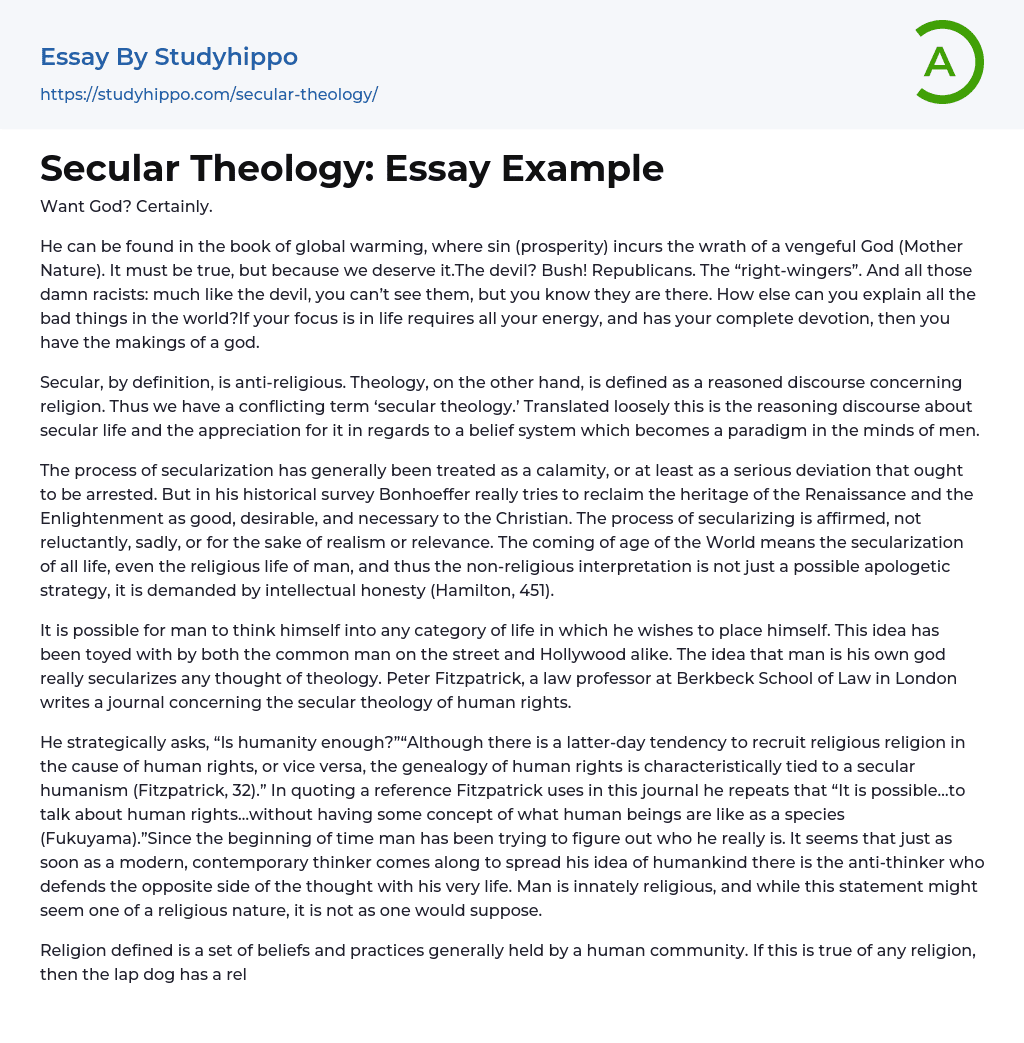Do you desire to have a connection with God? Absolutely.
The concept of sin in relation to global warming implies that our prosperity may anger Mother Nature, who is seen as a vengeful deity. Despite acknowledging our wrongdoing, we tend to shift the blame onto groups such as Republicans, right-wingers, and racists for all the negative events happening worldwide. If someone devotes all their energy and attention towards certain aspects of life, they can be perceived as possessing godly qualities.
The concept of 'secular theology' creates a dilemma by merging the irreligious essence of secularism with the rational discussion about religion that defines theology. Fundamentally, it entails deliberations on worldly existence and acknowledging its significance within a system of beliefs, establishing a model in human reasoning.
In the past, secularization was seen as a negative occurrence that needed to be stopped. H
...owever, Bonhoeffer's historical analysis shows that the Renaissance and Enlightenment were positive and necessary for Christianity. He fully supports secularization as it is inevitable in the changing world. Even religious aspects of life must be secularized to keep up with this evolution. As such, non-religious interpretation should not just be used for apologetic purposes but also for intellectual integrity (Hamilton, 451).
The concept of being able to place oneself in any category of life through thought has been pondered by various individuals, from the general public to those in the entertainment industry. This notion of man being a self-made deity essentially disregards theological beliefs. Peter Fitzpatrick, a Berkbeck School of Law professor in London, addresses the topic of secular human rights theology in his journal.
The question posed is whether humanity is sufficient, strategically. Fitzpatrick's referenc
in this journal emphasizes the connection between human rights and secular humanism. Fukuyama's idea that discussing human rights does not require a clear concept of humanity as a species is reiterated by Fitzpatrick. Throughout history, defining one's true identity has been a struggle for humans. As contemporary thinkers advance their theories about humankind, anti-thinkers defend their opposing viewpoints fervently. Despite its suggestion of religiosity, the statement actually reflects man's inherent religiosity.
Religion can be described as a shared system of beliefs and practices within a community. Interestingly, even a lap dog can exhibit religious devotion to its owner. Additionally, there is a concept of secular spirituality that involves a belief in something spiritual without necessarily being tied to a specific religious institution or tradition.
The Asian way of presenting spirituality is to achieve harmony with the universe, which is a spiritual practice akin to singing in church, but without any religious association. Peter Van Ness's book, Spirituality and the Secular Quest, raises the idea that spirituality may not necessarily be always tied to religion, as generally understood.
The importance of theology, which stems from the spiritual nature of humankind, is not solely related to organized religion. The possibility that unused parts of the brain could lead to miraculous abilities has not been proven, but it is worth considering. If secular theology is based solely on human reasoning, how does it differ from other theological approaches? Religious traditions may no longer provide fulfillment for individuals, leading to changes in beliefs and practices. Humans are both spiritual and curious, driving innovation and a better quality of life. Spirituality has elevated human life to a higher plane.
With more time, his progress
will continue to increase. References: Orin, S.F. (n.)
The URL http://www was used to access the webpage "Secular Theology" on April 13, 2007.
In 2006, Onlyrepublican.com posted an article by William Hamilton called "A Secular Theology For A World Come Of Age," which was originally published in Theology Today in 1952. The article can be found at http://www.onlyrepublican.com/orinsf/2006/04/secular_theolog.html.
On January 1962, Peter Fitzpatrick wrote an article which can be accessed through the following link: http://theologytoday.ptsem.edu/jan1962/v18-1-article3.htm
The "Humanity Enough? The Secular Theology of Human Rights" article was included in the 2006 "Human Rights and Human Welfare" forum for works in progress. It can be viewed via this link: http://www.du, which was accessed on April 13th, 2007.
Here is a link to a PDF file on the website edu/gsis/hrhw/working/2006/32-fitzpatrick-2006.pdf. The file is titled "Spirituality and the Secular Quest" and was written by Peter Van Ness in 1996. The publisher is Crossroad Publishing and the book is about spirituality and its relationship with modern secular society.
Galanter, Marc's book titled "Spirituality and the Healthy Mind: Science, Therapy, and the Need for Personal Meaning" was published in 2005 by Oxford University Press in New York.




